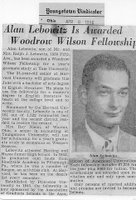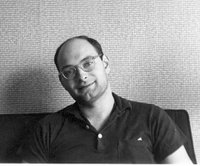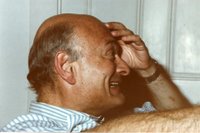from Lee Edelman
 I lack the novelistic imagination required to capture my sense of Alan in a series of anecdotal recollections. To succeed in this genre would demand the talents I associate with Alan himself--talents that Alan spent so much time and energy cultivating in others. I continue to marvel at the patience, the generosity, the enthusiasm he brought to his discussions with students about the progress of their creative writing. Because Alan's office was opposite mine, and because we both used to work with our doors left open, I spent many hours preparing classes while overhearing Alan's conversation with an externally variable, but fundamentally unchanging, undergraduate attempting to describe a story that really wasn't quite "there." Being inclined by temperament to believe that taking seriously the undergraduate "creative" imagination would be a punishment more intolerable than Sartre's idea of hell, I never failed to wonder at Alan's capacity not only to listen to what seemed to me so much dreary banality, but also to elicit from it shape, originality, texture, the movement of thought. How much of that was Alan's skill at discovering the pearl in the oyster's drool and how much was the gift of handing over his own, and far more compelling, ideas, is something I'll never know. But I'll never forget how Alan brought together encouragement with rigor, support with a constant goading toward something more shapely, more particular, more distinct. Nor will I forget how those conversations were invariably punctuated by laughter. Alan's knack for putting his students at ease, for giving them the support they needed to take intellectual and emotional risks, made it possible for him to push them beyond what others might have seen as their limits.
I lack the novelistic imagination required to capture my sense of Alan in a series of anecdotal recollections. To succeed in this genre would demand the talents I associate with Alan himself--talents that Alan spent so much time and energy cultivating in others. I continue to marvel at the patience, the generosity, the enthusiasm he brought to his discussions with students about the progress of their creative writing. Because Alan's office was opposite mine, and because we both used to work with our doors left open, I spent many hours preparing classes while overhearing Alan's conversation with an externally variable, but fundamentally unchanging, undergraduate attempting to describe a story that really wasn't quite "there." Being inclined by temperament to believe that taking seriously the undergraduate "creative" imagination would be a punishment more intolerable than Sartre's idea of hell, I never failed to wonder at Alan's capacity not only to listen to what seemed to me so much dreary banality, but also to elicit from it shape, originality, texture, the movement of thought. How much of that was Alan's skill at discovering the pearl in the oyster's drool and how much was the gift of handing over his own, and far more compelling, ideas, is something I'll never know. But I'll never forget how Alan brought together encouragement with rigor, support with a constant goading toward something more shapely, more particular, more distinct. Nor will I forget how those conversations were invariably punctuated by laughter. Alan's knack for putting his students at ease, for giving them the support they needed to take intellectual and emotional risks, made it possible for him to push them beyond what others might have seen as their limits.That laughter, of course, was something I got to enjoy more directly as well. I fondly recall the many late afternoons when Alan and Linda and I would gather in one or another of our offices just to share our sense of the absurdity of some aspect of the academic life. Those conversations, which allowed for an abreaction to the vagaries of the institution itself, were important parts of the day for me, and they sealed a bond that remains one my fondest memories of life in East Hall.
Now that Alan is enjoying his life outside of East Hall, I have to confess that life within it seems seriously denuded. Not only do we miss his conversation, his wry sense of humor, his ironic perspective on the daily goings-on, but we also miss his wisdom in department meetings, his unfailing sense of perspective, and his embodiment of departmental continuity. Maybe, in part, we also miss having him there to be the "elder" statesman--a role that now seems, oddly and disconcertingly, to have fallen to us! But Alan filled the role so much better.
Fortunately, Alan's retirement from East Hall is really only nominal. He'll be back in the fall to teach again and that will allow us to prolong our sense that all is right with the world. In the meantime, though, we take comfort in the thought that he's finally free to read, write, and think without the distraction of papers to grade or meetings to attend or those damned letter of recommendation to write. And then, of course, there's the added comfort of knowing that we can always arrange to have dinner with him and Nan!
The English Department at Tufts is much diminished without Alan there. So I'm delighted to think, as this semester ends, that he'll be back again in the fall. And delighted as well that the summer ahead will give us a chance to get together and relax!


